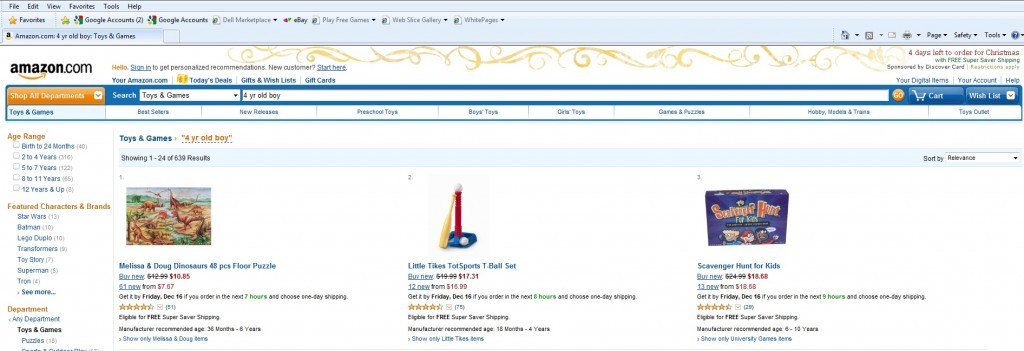Blog
As one of our employees was shopping online for Christmas presents, he ran across this pay per click ad from Amazon: a sale on four year old boys (Free 2-day shipping w/ Amazon Prime)!
Since he wasn't interested in buying a child, this ad came as quite a surprise. But with free shipping…
Seriously though, how can this happen? Amazon must spend millions on its pay per click campaign, and you would think that their budget would be devoted to products they actually sell. This ad highlights why pay per click isn’t as easy as you’d think, and that careful management is needed to not only convert clicks into sales, but also prevent embarrassing ads like this one from appearing.
As a quick refresher, pay per click (PPC) ads are the results you get from a search in Google that are surrounded by a light yellow box above and/or to the right-hand side of organic search results. This is a very successful marketing tool for many companies because you only pay if a searcher actually clicks on the ad (hence the name). Advertisers essentially write an ad, include a link to their website and then bid on keywords they think prospective customers will search.
However, there is a lot more to it than that. You can tailor your ads to appear only to users in specific regions or at a specific time of day. For instance, a Florida plumber who works 8am to 8pm would not want to have his PPC ad appear at midnight to a searcher in Texas. If someone in Texas clicked on that ad, it would obviously not result in a call and that plumber will quickly waste his PPC budget. There is also dynamic keyword insertion (which is probably related to what is causing Amazon’s problem above), in which you are able to replace certain words in your ad to match the search used to trigger it. While this can tailor your ads to a searcher for a higher click through rate, it has to be carefully managed so you don’t, like Amazon, wind up advertising something that makes no sense.
This is only scraping the top of some of the elements of PPC management. There are things like quality scores, which affect where you ad is shown, and negative keyword lists to prevent your ad from displaying when people search for certain phrases. A good PPC manager will take all of these into account and be able to increase your conversion rate from PPC ads and lower your cost per click. Your PPC campaign also needs to be examined on a regular basis to ensure that the clicks you are getting are turning into sales and leads. Certain keywords work better for certain businesses and regions, and careful attention is needed to create ads that will get you as many customers as possible.
Since even retail giants like Amazon can make mistakes, it’s clear that PPC is not something you want to turn over to the amateurs. iMarket not only offers professional PPC management, but with our call tracking service, we are able to determine what PPC ads are leading to sales. We have the tools to make your campaign worth every penny you spend on it. And to ease your mind, Amazon is not selling 4 year old boys. When you click on the ad, it takes you to their Toys & Games page, filtered by items for “4 year old boys”.


